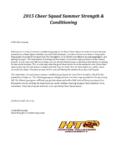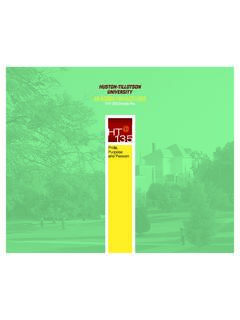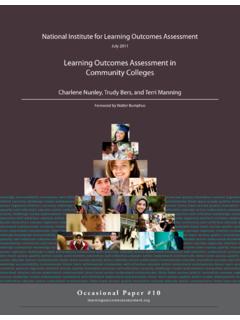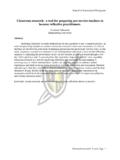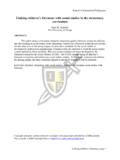Transcription of The Importance of Student Learning Outcomes: An ...
1 The Importance of Student Learning Outcomes: an institutional perspective Dr. Dorothy Cowser Yancy President Johnson C. Smith University HBCU, private, undergraduate institution Liberal Arts Comprehensive Located in Charlotte, North Carolina 103 Faculty Enrollment 1474. Faculty Development Program ThinkPad University (Technology Infrastructure). Freshman Academy Learning Community Model 2. Our Mission The University endeavors to produce graduates who are able to communicate effectively, think critically, learn independently as well as collaboratively, and demonstrate competence in their chosen fields . 3. Our QEP. Strengthening the Quality of the Freshman Year Experience through Increasing Student Engagement 4. History of Assessment of Learning Outcomes JCSU. Phase I: 1987-92. Retention and Academic Achievement Phase II: 1993-1995. Early Outcomes Assessment by Program Phase III: 1996-2003 - Technology and Learning Outcomes Phase IV: 2004 to Present Transformative Assessment: Emerging Framework 5.
2 Phase I. 1987-1992 Retention and Academic Achievement Freshman Studies Sophomore Competency Assessment Major Field Assessment (MFAT, ACAT). Establishment of Center for Teaching and Learning General Studies Faculty Development Office of Assessment Academic Support Services 6. Phase I: Lessons Learned Continuous Senior Norms Improvement as a standard for institutional Assessment Practices Improvement statistically defined as an increase in means with a decrease in standard deviation -- Deming Sophomore Competency Testing Academic Profile Sophomore Cohorts 7. Freshman to Sophomore Year Retention Results 8. Phase II: Assessment Activities 1992-1996 institutional Coordination of Outcomes Assessment by Degree Programs Formalization of MFAT, ACAT for degree programs Student Satisfaction Surveys Standardized Testing Day (Each Semester). Senior Seminar and Capstone Courses Senior Investigative Paper Service Learning Establishment of the combined Office of institutional , Planning, Assessment, Effectiveness and Research (IPAER).
3 Formal Strategic Planning Initiative 9. Phase III: Assessment Activities 1996-2003 Technology and Learning Outcomes Bush-Hewlett Faculty Development Program Mellon Technology Improvement Project ThinkPad University Planning Teaching and Learning with Technology Roundtable Flashlight Online and Small Classroom Studies UNCF Faculty Development and Technology Project Introduction of the Mini-Grant as Assessment Learning Strategy STA Program Initiated Instructional Technology (Information Services). 10. Phase III Lessons Learned How technology is used to carry out an educational Triadic Thinking activities determines the Learning outcome nature of Learning outcomes, not the technology itself Educational Activity Seven Principles of Good Practices in Undergraduate Education Technology Mini-Grants team projects of small classroom studies 11. Phase III Strategy: Mini-Grants Faculty Development Projects Early and Successful Strategy 2 to 3 faculty working together on a classroom improvement project Required an assessment plan Pre- Faculty Learning Community focus which emphasizes Learning Outcomes within the context of Scholarship of Teaching and Learning (SoTL).
4 Values Transformative Assessment Strategy 12. Phase IV. 2003 Present Transformative Assessment as an Emerging Framework The Purpose of Assessment is align with institutional plans and supports collaboration of faculty, staff, and students Data Acquisition and Analysis should be informed by multiple sources that can illuminate Student Learning processes and purposes Assessment Findings are used for the improvement of teaching and Learning and to support the operational culture of evidence . Dissemination internally and externally with the intention to expand collaborative partnerships 13. Transformative Assessment Transformative assessment systems are institution- wide assessment strategies that are: Based on institutional vision and goals. Implemented in an integrated way for all levels (the course, the program, and the institution). Aligned around systematically transforming teaching and Learning , to improve Student Learning outcomes.
5 Used as a tool for communicating the nature of the desired transformation of teaching and Learning . Includes the design, planning, implementation and evaluation of the use of technology. -- Brown, Ehrmann, Suter, Lippencott 14. Phase IV Project Activities BeTA Project (Better Teaching through Assessment). Transforming course evaluation data for the improvement of teaching and Learning Creating a culture of reflective practice among faculty and students Linking Learning outcomes to practices institutional ownership of course evaluations process Visible Knowledge Mapping (VKM) - useful technique for working with faculty, administrators, and students to clarify their ideas, individually and then collectively, about the nature of good teaching and good courses. Concept Mapping - Strategy for creating consensus and inquiry among a diverse constituency for program planning and evaluation 15. Phase IV Major Development Leaning Outcomes Assessment incorporated in Strategic Plan Increased Use of Technology to facilitate assessment activities (SharePoint Assessment Portal, Flashlight Online, TrueOutcomes Assessment Archive).
6 JCSU QEP encourages the development of practices to increase Student participation in Assessment as critical to increasing Student Engagement Reflective Practice Improving the quality and quantity of Student responses and participation levels Student academic and career development 16. Phase IV Current Status Increased Assessment Archive and granularity at the Management Software - course and TrueOutcomes instructional activity E-Portfolio Assessment Tools Learning Outcomes level Assessment in each degree The university as program QEP Focus on Student Learning Community Engagement From Mini-Grants to Learning Outcomes Faculty Learning institutional Process Emergence of Faculty Communities Learning Communities 17. Special Focus: The JCSU QEP. SACS QEP Requirement invites institutions to engage the issues of Learning outcomes in the context of a transformative framework Strengthening the Quality of the Freshman Year Experience through Student Engagement.
7 Active Learning Critical Thinking Student Engagement in Assessment Student Planning for Future 18. Phase IV Strategy: Faculty Learning Community (FLC). A faculty Learning community (FLC) is a cross- disciplinary group of 6-15 faculty and staff engaging in an active, collaborative, year- long curriculum program about enhancing teaching and Learning Transformative Assessment Strategy 19. Current Faculty Learning Communities institutional Effectiveness E-portfolios Hybrid Courses Teaching with Course Management Packages Learning Communities in the Classroom Student Engagement (QEP Focus). Research and Scholarship of Teaching (SoTL). Mobile Computing and the Classroom Teaching and Scholarship (New Faculty Cohort). 20. Activities of JCSU FLCs Bi-weekly meetings Website development Seminars and workshops on FLC topic Post School workshops on the Scholarship of Teaching and Learning Community Retreat on Scholarship of Teaching and Learning (SoTL) Research Projects FLC Collaborative with Miami University to recruit other HBCUs for FLC projects 21.
8 The Learning Outcomes Assessment Plan Mission Program Goals and Objectives Assessment Measures Program Alignment Curriculum Matrix Explicit Assessment Implementation Plans Assessment Archive and Results Reporting Meaningful Assessment and Use of Results Continuous Improvement 22. Reflect on the Mission Goals General aims or purposes of the program or curriculum Performance/. Cognitive Affective What does the Student Skill What does the Student know? What can the Student care about? do? Objectives Objectives Objectives Objectives Objectives Objectives Objectives Objectives Objectives Use Variety of Instruments Assessment Measures Senior Thesis Performance Capstone Student Senior Essay Comprehensive or Research Experience Course Portfolios and Interview Exam Project Other Alternatives Course-embedded, Student Self-Assessment, Student Peer Assessment, Secondary Reading, External Examiners, Department Historical Data on Student Performance and Placement, Focus Groups, Alumni Surveys and Studies, Research Studies 24.
9 Seek Coherence a l Go Course 1. Course 2. Course 3. O. Course 4. Program Activity 1. 25. Explicit Implementation Plans Assessment Implementation Who When Responsible Implemented When When Analyzed Reported Schedules and Responsibilities 26. Simple and Consistent Data Archive and Results Reporting Outcomes Databases Baseline 2004 2005 2006 2007. Year 27. Meaningful Use of Results 28. Continuous Improvement Identify Outcomes Implement Change Assessment Gather Evidence Cycle Interpret Change 29. Some Challenges Trying to measure everything that moves Being overly rigorous or too precise Not focusing on really meaningful outcomes Lack of collaboration and public sharing Evidence should be cumulative and be collected throughout a program (Curriculum Matrix). Encouraging multiple perspectives, judgments, dimensions of Student Learning Developing a consensus of assessment tools and reflective practices Transforming folklore and anecdotes into evidence.
10 30. Creating the Shift Commitment to change through planning and operational decision making; Assessment and Strategic Planning, and Budgeting are linked Collaboration among institutional stakeholders;. Everyone must be engage to sustain a true transformation Organizational motivation with a commitment to individual and organizational Learning Use of technology to facilitate change and assessment Faculty Development with on-going training and community support for Learning Outcomes Assessments 31. Our Networks Building Engagement and Attainment for Minority students (BEAMS). NYU Faculty Resource Network HBCU Faculty Development Network (HBCUFDN). Professional and Organizational Development Network in Higher Education(POD). The Collaboration for the Advancement of College Teaching and Learning Teaching Learning with Technology-Group 32. Primary Contributors to the JCSU Campus Dialogues on Assessment Milton Cox Faculty Learning Community Vincent Tinto Retention, Learning Community Steve Gilbert Technology, Dangerous Questions Tom Angelo Classroom Assessment, CATS.
